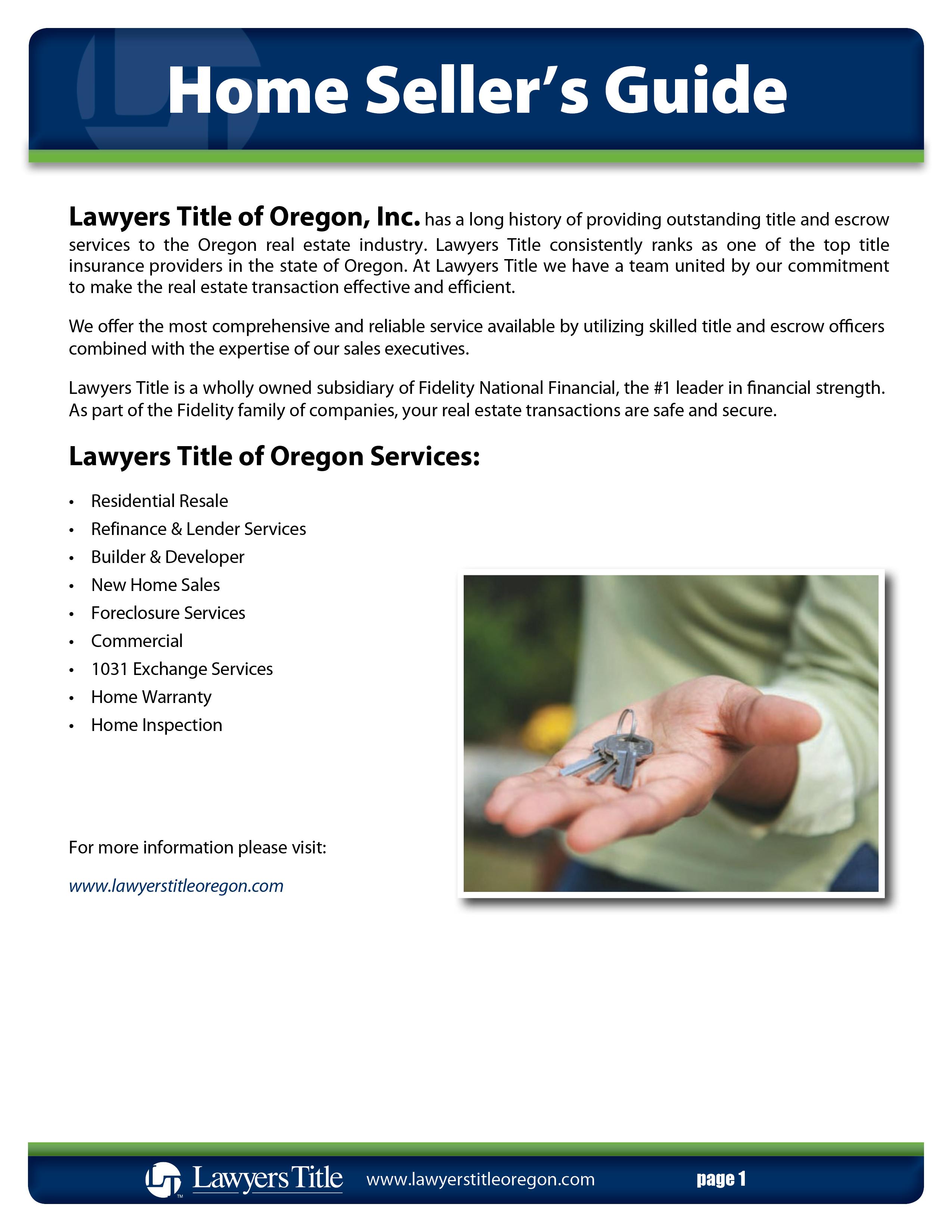











Most of us do not like to spend money unnecessarily, especially when we feel we could do the job at hand as well as the person or persons we are hiring to complete the task. It would be a good idea to consider the following questions to assess the process of handling the sale of your property yourself, before attempting to do so:
• Do you know how to determine the current market value of your home?
• Do you know how and where to advertise your home most effectively and what the costs will be?
• Did you know that each REALTOR* has access to a Multiple Listing Service (MLS), which is a database of properties listed for sale by REALTORS”. Real Estate Agents refer to MLS for prospective properties to show their clients and for comparable sales when determining value for a prospective listing. Only real estate agents have access to this information.
• Have you made arrangements for your home to be available for showing 12 hours a day, 7 days a week. If not, each hour that you do not provide this availability your home is “off the market”.
• Are you concerned about having strangers walking through your home?
• Do you know how to determine whether or not a buyer can qualify for a home?
• Are you conversant enough with real estate law to write a legal and binding real estate contract?
• Do you understand the steps of an escrow and what is required of you and the buyer to complete the transaction?
• Do you know which title company, real estate attorney, termite company, inspection company and lender to hire that will provide the best service and costs to you?
• Do you have experience with resolving problems and protecting your rights in a real estate transaction?
Your home is probably your largest investment. You are the only one who can determine whether or not you should attempt to sell your home by yourself. Talk to a REALTOR® before you decide. You may find that working with a professional is a lot less expensive and will get the job at hand done in a more timely and less stressful manner than attempting to do it yourself.

Without the professional guidance and expertise of a REALTOR®, selling a home can often entail many unnecessary complications. The following information, as prepared by the National Association of REALTORS®, best describes the many benefits of contacting a professional REALTOR® to handle all your real estate needs. The term REALTOR® is a registered, collective membership mark which identifies real estate professionals who are members of the National Association of REALTORS® and abide by its strict Code of Ethics. A REALTOR® is bound by a Code of Ethics and pledges to protect and promote the interest of the seller by providing fair treatment for all parties involved in the transaction. Here are some ways a REALTOR® can help you sell your home:
Promotion By:
• Preparing a flyer to describe your property for public distribution.
• Posting a “For Sale” sign on your property.
• Advertising in the media. This includes MLS, flyers, local paper and home buyer magazines.
Viewing By:
• “Open Houses” for the buying public.
• Conveniently scheduled appointments for house showings.
Networking By:
• Neighborhood mailings.
• National relocation services.
• The Real Estate Association.
• Their personal network of clients.
Working With
By:
• Conferring with you regarding when you want to place your home on the market.
• Establishing a sale price based on the following:
- Research of comparable properties.
- Considering the current local market conditions.
• Establishing your probable net proceeds.
• Advertising your home and making suggestions on what you can do to make your property more sellable.
• Reviewing the necessary paper work with you.

• Reviewing the contract and your obligations.
• Explaining contingencies and release clauses.
• Explaining the legal disclosure requirements.
• Explaining the ramifications of pest control inspections/reports.
• Explaining your responsibilities regarding the condition of the property.
• Examining offers closely and explaining the reasons behind a possible counter-offer.
• Following closely the progress of the buyer’s loan and coordinating the payoff of your existing loan.
• Facilitating the appraisal process.
• Staying in constant communication with the buyer’s agent to ensure a smooth escrow.
• Closely monitoring contingency removal dates and discussing these with you.
• Coordinating the details of the transaction with the escrow officer.
• Making sure you get your check and settlement documents promptly after closing.


• Let the front of your house greet guests with a clean, maintained yard by fertilizing lawns, planting fresh seasonal flowers, trimming overgrown shrubbery.
• Painting can be expensive, but a little touch up goes a long way.
• Make sure your front door is solid, fresh, and welcoming.
• Inspect the roof for necessary repairs and any visible broken tiles or shingles.
• Repair cracks in the driveway and sidewalks. Clean up oil stains.
• Mend or paint neighboring fences or walls.
• Simple, inexpensive redecorating such as paint and accessories can result in a quicker sale at a higher price. Light neutral paint colors, such as off-whites, permit most every one to “imagine” their furnishings in your home.
• Clean carpets if they are heavily soiled. Spot clean stains.
Eliminate the Distractions
• Repair the minor flaws that can detract from your home’s value, such as leaky faucets, sticking windows and doors, broken handles and knobs.
• Remove cobwebs from ceilings and other areas.
• Remove all unnecessary items in your attic, basement, or other storage areas and organize all closets to show ample space.
• Remove excess furniture so rooms don’t look small and cluttered.
• Have a garage sale to dispose of unneeded items-looks better now and less to move later!
• Check and repair caulking in showers and bathtubs.
• Install new shower curtain liners. Keep bathrooms looking and smelling fresh.

Your agent can research comparable sales in your area and advise you of the appropriate price range for your property.
Have your agent explain what financing options are available. Flexibility on financing terms may secure a better selling price.
Ask a real estate professional to determine whether the market cycle is poised to net you the most money.
Lock boxes are a great way to make your home most accessible to agents for showing. Appointment-only showings are the most restrictive. If your lifestyle is not compatible with frequent showings, your agent will help you determine a solution to suit your needs. Remember, the easier a home is to show, the better the odds are of getting the deal you want.
Make sure your agent utilizes the latest technology, such as Internet sites and social media that cater to home-buyers. In some areas, cable advertising is popular. Others use 800-number interactive voice response systems. A good agent will know where you can get the best exposure.
Put some items in storage, create more light, play music or otherwise improve the ambience. Your agent can offer helpful advice to create the right first impression.
Do not base selling decisions on the seasons. Property sells year-round.
Re-evaluate your agent’s marketing plan periodically. Make needed adjustments based on the current market and buyers.

Eighty percent of all buyer activity comes from signs and MLS listings. So, if you are not getting offers and are flexible with showing your home, it may be time to re-evaluate your price, not necessarily your agent.
Sales have gone south thanks to unkempt lawns, cluttered closets, unpainted front doors, hard-to-work locks, blown light bulbs, bad color, stains, unlit areas, and foul smells. Spend time on the little things. Double up on your gardening. Keep things cleaner than usual. Take serious control of your pets during this time period.
Before making improvements, prior to listing, consult a real estate professional. Some upgrades will not yield any real increase in value, while others may increase property value substantially. Ask for low-cost solutions to minor repairs that will yield the best profits.
Homes may take three to six months in any market. Estimate how much time you have before you need to sell and then plan ahead to allow extra time. You don’t want to be forced to accept a disappointing offer.
One of the best reasons for hiring an agent is his or her ability to pre-qualify a prospect financially so that you don’t lose valuable negotiation time. Your agent may discover when a prospect has an ulterior motive for shopping homes.
The top agents in the industry report that their sellers are responsible for at least one out of ten sales. You can network with your business and personal friends, hand out flyers, and keep your house in move-in condition. Your agent should be ready to hand you all sorts of assignments to make the team effort successful.
Never put your property on the market unless you really want a sale! Get ready for a professional sales push when you list. If your plan harbors some indecision, resolve it before you list because success is every great agent’s objective!

F If possible, make arrangements to be out of the house to permit the agent to do “their job.” If you are home, don’t force conversation with potential buyers. Be polite, answer questions, and point out highlights. They want to inspect your house, not make new friends.
F Protect your pets. Keep them out of the way in a restricted area or even out of the house.
F Open all blinds and drapes to make the home light and cheerful.
F Turn on additional lights and lamps as needed.
F Remove excess clutter from floor, tables, and counter tops.
F Keep your valuables safely locked up or out of sight.
F Clean the bathrooms so they sparkle!
F Don’t forget to make the bed and do the dishes.
F Dust and vacuum the house thoroughly.
F Removes excess toys and equipment from yards.
F Wash down your driveway and patios.
F Turn off all TVs. Very soft background music may be acceptable in some cases.
F Fresh flowers in the front yard, on the porch, and in the house can create a welcoming effect.
F Light refreshments such as tea and cookies are a nice touch-fresh baked cookies or simmering cinnamon potpourri creates a pleasant aroma (or check with your agent to see if refreshments will be provided).


Receive and review Earnest Money Agreement and Broker’s Instructions
Open escrow. Order title report.
Determine financing.
Receive title report. Send copies as requested.
Resolve any title issues. Order any pay-off demands.
Review file.
(Are all conditions satisfied? Contingencies removed?)
Request fire insurance.
documents and Prepare closing other documents.
Obtain signatures and closing funds from Buyer/Seller.
Record transaction with the county.
Close file. Prepare final statements. Disburse funds.
Forward final documents to all interested parties –Buyer, Seller, Real Estate Agents, Lender, Broker, Attorney, etc.
Notify Escrow with name of new lender and loan officer.
Send title report to lender.
Notification of final loan approval. (Are repairs complete?)
Deliver Seller & Buyer Closing Disclosures. Buyers’ consumation 3 - 6 days.
Loan documents delivered to Escrow.
documents Return loan for approval to record.
Order loan funds.

1.The Listing Agreement
Property owner (Seller) initiates a contract, or a listing agreement, with a licensed real estate agent.
2.The Sale
Property owner (Seller) enters into a purchase contract, typically referred to as an Earnest Money Agreement, with a Buyer.
3.The Escrow
As part of the purchase contract, Seller agrees to purchase a title insurance policy for the Buyer and both agree to close the transaction with a licensed escrow company. In Oregon, most title insurance companies also offer escrow services to facilitate a convenient “one-stop” approach to closing real estate transactions.
An escrow is a neutral third party depository for legal documents and funds necessary to complete a real estate transaction. The escrow agent will disburse funds and record documents for the proper recipients according to their written instructions. As part of the purchase contract in a real estate sale, Seller agrees to purchase a title insurance policy for the Buyer and both agree to close the transaction with a licensed escrow company. Lawyers Title of Oregon offers both title insurance and escrow services to facilitate a convenient “one-stop” approach to closing real estate transactions.
What title insurance and escrow costs are incurred in a real estate sale?
The fee for escrow services is based on the sales price of the property. This fee is typically split equally between the Seller and Buyer. However, Buyers should check with their lenders if financing is involved because some federally insured lending programs do not allow borrowers to pay this fee. The Seller typically pays for a standard owner’s policy of title insurance which names the Buyer as the insured. Charges for this policy are based on the sales price of the property. The Buyer typically pays for a lender’s policy of title insurance and any required endorsements if s/he is obtaining a new loan to purchase the property. Charges for this policy are based on the loan amount.
services
The escrow officer facilitates the closing procedures. For a typical sales transaction, these services include:
•Ordering the title insurance policies. Prior to the issuance of a policy, the title company will issue a preliminary title report which is sent to all interested parties involved in the transaction. The report will detail the current condition of the title to the property.
•Prorating taxes, insurance, etc.
•Clearing any liens, encumbrances against the property as per instruction.
•Preparing a closing statement for each party showing all credits and debits. The escrow agent will schedule appointments for all parties to sign the necessary documents to complete the transaction.
•Returning signed loan documents for the lender to review and approve and forwarding all necessary documents to recording.
•Disbursing funds as per written instructions and issuing title insurance policies to the proper parties.

Title insurance is designed to protect an owner of real property and/or a lender against actual loss resulting from title deficiencies.
Generally when an owner agrees to sell real property or applies for a loan, he/she represents to a Buyer or a lender that the title is clear or will be cleared of particular encumbrances, while other acceptable encumbrances may remain.
Title insurance will confirm the status of encumbrances that may affect title to the real property. The PRELIMINARY TITLE REPORT states the condition of the title at the time title insurance is ordered. After the sale or loan is closed and the transaction completed, a policy is issued detailing the encumbrances that remain in effect. These encumbrances have been accepted by the Buyer and/or lender involved in the transaction and may include the new financing encumbrances as well as other exceptions like covenants, conditions and restrictions or utility easements.
AN OWNER’S POLICY (ALTA) is issued for the full purchase price and is typically paid for by the Seller. An Owner’s policy is in effect up to the amount of the policy until the property is sold and title is passed to new purchasers.
A Lender’s policy is issued to the new lender for the amount of the new loan and is typically paid by the Buyer or borrower. The Lender’s policy is in effect until the loan is paid in full and the obligation is released.
When a seller agrees to transfer clear title to a buyer, the parties will turn to a title company. It will examine the title to identify matters that may need to be cleared as a condition of the purchase. To this end, the title company produces a preliminary report showing the status of the title. The report is preliminary to, and becomes the basis for, a policy of title insurance to the buyer and, if the buyer is financing the purchase, to the buyer’s mortgage lender. The title examination is an examination of documents recorded in the county land records, of some local court records and of records of local taxing authorities. The purpose is to verify the seller’s ownership and to identify liens and encumbrances of record. In general, the monetary liens will be cleared through an escrow, such that a buyer usually acquires title free of monetary liens. Other encumbrances will remain, such as planned community or condominium declarations of covenants, conditions and restrictions. Either way, the process is one of identifying matters that need to be cleared through escrow and matters that, by agreement of the parties, will remain in place.
For a real estate transaction placed in escrow, “closing” is the final process necessary to complete the transaction. In a typical sale transaction, “closing” takes place when:
•Both the Buyer and Seller have signed and fully executed the necessary documents.
•The Buyer’s money has been deposited into the escrow account.
•The lender has approved the signed documents and released them for recording (note: lenders typically have 24-72 hours to read and approve documents for recording).
•The lender has wired or sent loan funds that are deposited and ready to disburse.
•The new deed and financing documents have been recorded at the county.
The above steps must be accomplished before keys are released to the new Buyer (unless there are written instructions to the contrary) and the Seller’s proceeds check is disbursed.
•Contact your insurance agent and obtain a binder showing proof of hazard (fire) insurance coverage. Please provide your escrow officer and/or your loan officer with the name and number for your insurance agent.
•The monies you are asked to deposit at time of closing must be in the form of a cashier’s check, or be wired into the escrow account by your bank.
•Bring your picture identification to the closing appointment. Your escrow officer will ask to see your identification before notarizing your signature.
•As we get closer to the contract close date, try and be as flexible with your schedule as possible in order to accommodate signatures. With many parties involved in a real estate transaction, even the best laid plans can become last minute fire drills.
•Make sure to inform your escrow officer as early as possible if you will need special accommodations for signing, such as requesting a mobile notary to come to your place of business.
Lawyers Title will go above and beyond to make the closing experience as effortless as possible on your end. As a courtesy, you can sign your documents in any of our six branches conveniently located throughout the tri-county area.

When you sell your house and the buyer is securing a new loan in order to purchase the property, the buyer’s lender requires a licensed appraiser to estimate the market value of the property to show the lender that they are making a prudent decision lending the buyer the money to buy your house. The cost of the appraisal is negotiable.
Once the buyer begins the new loan application process, the lender will order the appraisal. In order to estimate the market value of your house, the appraiser will research the houses which have sold in your subdivision and/or your immediate area. Appraisers prefer to use sales which have occurred within the past 6 months and are similar to yours in regards to square footage, year built and amenities (i.e. swimming pool, garage, single story).
The appraiser will measure your home, take photographs, and examine your house for its condition, specific improvements and amenities. You can help the appraiser by preparing a list of recent improvements and remodeling that has been done and include the approximate amounts spent for each improvement. Some appraisers will appreciate this information while others may not. However, if you had the information prepared for buyers looking at your home, then providing it for the appraiser will be a snap.
If the buyers of your property are getting an FHA or VA loan, a few special requirements will be placed on your house. You must scrape and paint all chipping or peeling paint on your house or any structures on the property. You should also replace any missing or damaged shingles and missing slats or blocks in your fence.
The lender will receive a copy of the appraisal a few days after the appraiser has been to your home. You may be told that the appraiser has some repair requirements before the lender can loan the buyer any money on your house. In that case, you must repair these problems and the appraiser will return for a re-inspection for an additional cost.


The standard Oregon Association of Realtors® purchase contract used by most real estate agents contains a provision that allows the buyer to physically inspect the property being purchased, either by himself or by a professional inspector or inspectors within the first ten days of acceptance of the contract by the seller. It is the seller’s obligation to provide the buyer access to the property during this ten day inspection period for any inspections the buyer requires. Below is a list of common types of inspections.
• To determine any active infestation by wood destroying organisms.
• To determine whether there is any earth to wood contact, cellulose debris or faulty grades on the property. In the event that there are wood destroying organisms or secondary issues with regard to the property, generally these issues must be addressed prior to the close of escrow and if the termite company that did the initial report does not do the repairs, then the property must be reinspected by a termite company and a clear report deposited into escrow, prior to the close of escrow.
• This inspection can encompass inspection of the roof, plumbing, electrical, heating and any other accessible area of the property.
• A detailed report or reports will be written by the inspector or inspectors with recommendations for repairs, and same will be delivered to the buyer. Subsequently the buyer will request of the seller any repairs that the buyer wishes the seller to be responsible for, which, if the seller agrees to the repairs, would be completed prior to the close of escrow.
Other Common Inspections Might Include:
• Well and Septic
• Hazardous materials
• Chimney
• Heating and Cooling
• Survey
• Zoning and Building permit compliance
• Structural Engineering


Home Warranties are insurance policies designed to protect a seller during the listing period and a buyer for one year after the close of escrow, against repair costs for mechanical systems and major appliances. The cost of a home warranty policy is a one time fee which either the buyer or the seller can pay at the close of escrow and which is renewable annually. There are a variety of home warranty companies and plans. The plans vary according to the optional coverage chosen by the insured which might include, but not be limited to heating, air conditioning, dishwasher, washer, dryer, refrigerator, garbage disposals, and pool or pool and spa equipment.
A Few Of The Benefits Of A Home Warranty Are Listed As Follows:
• Replacement or repair of major or minor plumbing, heating or electrical problems during the policy period at a nominal service fee per incident.
• A full network of qualified technicians at your service.
• Protection of your budget against unexpected expenses for repairs or replacements of systems in your home for the first year of ownership (or subsequent years if renewed).


Buyer Typically Pays For:
• Lender’s title insurance premiums and endorsements
• Escrow fees 50%
• Property tax proration (from date of transfer to June 30)
• Interest on new loan (charged from date of funding to 30 days prior to first payment date)
• Fire insurance premium for first year of ownership
• All new loan charges (except those required to be charged to the Seller by a lender or loan program)
• Recording charges for the new deed and loan security documents
Seller Typically Pays For:
• Owner’s title insurance premiums
• Escrow fee 50%
• Property tax proration (from July 1 to date of transfer)
• Real estate sales commission
• Loan fees required by Buyer’s lender or loan program
• Any liens or judgments levied against the Seller
• Recording and release charges for any documents used to release liens against the property
• Any delinquent property taxes
Note:
Lawyers Title provides this sheet to familiarize customers with typical closing costs for a normal sale transaction. Each transaction is different and may vary from this guideline. Customers are cautioned to check with their lender and escrow officer to get information on actual charges and costs.

Q. When do I get my proceeds check?
A. On the date of recording, you may request that your escrow officer either cut you a check for your proceeds or wire the funds directly into your bank account.
Q. Why do I have to pay interest on my loan pay-off past the day of recording?
A. Your lender continues to accrue interest to the date that they post your loan as being paid in full. This could be one or two days from the date your escrow officer sends your pay-off check via overnight mail or wire transfer.
Q. When do I get a refund from my impound account?
A. After your escrow officer sends your pay-off check to your existing lender, you can expect to get impound account back direct from your lender within 30-60 days. If you have any questions after that time, we suggest calling your lender.
Q. When do I cancel homeowner’s/fire insurance?
A. Please do not cancel your insurance until you have confirmed that your transaction has closed.
Q. Why does my escrow officer require that I complete a 1099 form?
A. A 1099 form is the reporting form adopted by the IRS for submitting the information required by law. Under guidelines established by the IRS, sellers of real property are required to have their sales price reported on the 1099 form.
Q. What is a Statement of information?
A. Statements of information provide title companies with the information they need to distinguish the buyers and sellers of real property from others with similar names, for the issuance of title insurance at close of escrow. After identifying the true buyers and sellers, title companies may disregard the judgements, liens or other matters on the public records under similar names.
Q. I don’t understand tax pro-rations. How do they work?
A. The fiscal tax year begins July 1 and ends June 30. Taxes are "a lien, due but not yet payable" until the tax rolls are certified on or before October 15. Property taxes then become a "lien due and payable." Property taxes are due on or before November 15. The escrow agent determines what portion of the current year's property taxes the Seller and Buyer should pay. Depending on what time of the tax year the transaction closes, the Seller will either be credited with his unused portion if the taxes are already paid or debited for the time he had possession before the taxes were due and payable.
Q. What will I need to take with me to Lawyers Title of Oregon to sign my closing documents?
A. Take one of the following: Oregon Drivers License, Oregon ID card or Military ID.

Old Residence
Preparing For The Move
F Leave keys & garage openers
F Travel funds (cash & checks)
F Defrost refrigerator
F Pet transportation
Address Change
F Bank accounts
F Subscriptions/magazines
F Forward address to post office
F Credit cards Utilities
F Telephone (check for refund)
F Gas (check for refund)
F Electric (check for refund)
F Water (check for refund)
F Cable (check for refund)
F Garbage pickup
F Bottled water, propane, etc.
Documents To Obtain
F Medical records
F Dental records
F School transcripts
F Veterinary records
New Residence
Address Change
F Ask postman to hold mail for your arrival
F Utilities
F Telephone
F Electric
F Gas
F Water
F Garbage pickup
F Cable
F Bottled water, propane, etc.
Schools, Licenses, Services
F Register children for school
F Register to vote
F Register car
F Driver’s License (apply for new address)
Medical Services
F New doctor
F New dentist
F New veterinarian